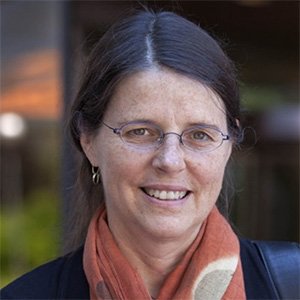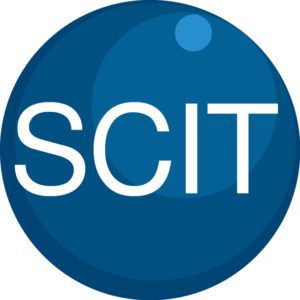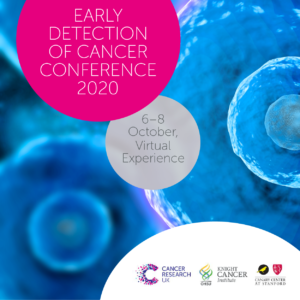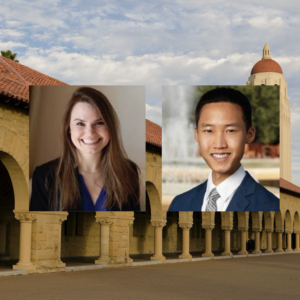
Cancer Early Detection Seminar
“Best Practices in Hip Imaging”
Michael Shen, PhD
Professor of Medicine, Genetics and Development, Urology and Systems Biology
Columbia University Medical Center
ABSTRACT
TBD
_____________________________________________
Hosted by
Sanjiv Sam Gambhir, MD, PhD<https://med.stanford.edu/profiles/sanjiv-gambhir>
Sponsored by
The Canary Center and the Stanford Cancer Institute
Stanford University
If you would like to be included on the email distribution list for weekly reminders, contact Ashley Williams (ashleylw.at.stanford.edu)
RSVP and more info at: https://www.onlineregistrationcenter.com/register/222/page1.asp?m=298&c=41

CEDSS: “Strategies to Identify Aggressive Breast Cancer Biology in Black and Latina Women”
Victoria Seewaldt, MD
Ruth Ziegler Professor and Chair, Department of Population Sciences
Associate Director for Population Sciences Research, Comprehensive Cancer Center
City of Hope
Beckman Center, Munzer Auditorium (B060)
11:00am – 12:00pm Seminar & Discussion
12:00pm – 12:15pm Reception & Light Refreshments
RSVP here: https://www.onlineregistrationcenter.com/VictoriaSeewaldt
ABSTRACT
Over 90% of breast cancer is cured; yet there remain highly aggressive breast cancers that develop rapidly and are extremely difficult to treat, much less prevent. Examples are triple-negative breast cancer in Black/African American women and luminal B breast cancers in Black/African Americans and Latinas. Breast cancers that rapidly develop between breast imaging are called “interval cancers”. Here we aim to investigate biologically aggressive precancerous breast lesions and their matched invasive breast cancers in women of diverse race and ethnicity. Our team has the unique ability to perform single cell in situ transcriptional profiling in combination with dynamic and spatial genomics/proteomics; this allows us to identify multi-dimensional spatial and temporal relationships that drive the transition from biologically aggressive pre-cancer to interval breast cancer.
ABOUT
Victoria Seewaldt, M.D., is an accomplished clinician and researcher who’s devoted to improving the lives of her patients and the community at large. She has led community outreach education efforts on cancer prevention through personal wellbeing and directed research aimed at finding biomarkers that can be used for early cancer detection, particularly triple-negative breast cancers that are especially resistant to treatment.
At City of Hope, Dr. Seewaldt will direct efforts to provide breast cancer education, free breast cancer screening and treatment, mentorship of young minority scholars, and a forum for community partnered trials. Clinically, Dr. Seewaldt aims to empower women at high breast cancer risk to be full partners in developing wellness strategies to promote personal health.
Dr. Seewaldt received her medical degree from the University of California, Davis, and completed her residency and clinical fellowship at the University of Washington in Seattle. She then pursued a medical oncology fellowship with the Fred Hutchinson Cancer Research Center and then became an assistant professor at Ohio State University. Afterwards, she transferred to Duke University, where she held various clinical, academic and leadership roles in its School of Medicine and Comprehensive Cancer Center — most recently as a professor, co-leader of the breast and ovarian cancer program and head of the cancer breast prevention program — before joining City of Hope.

Muna Aryal Rizal, PhD
Mentor: Jeremy Dahl, PhD and Raag Airan, MD, PhD
Noninvasive Focused Ultrasound Accelerates Glymphatic Transport to Bypass the Blood-Brain Barrier
ABSTRACT
Recent advancement in neuroscience revealed that the Central Nervous System (CNS) comprise glial-cell driven lymphatic system and coined the term called “Glymphatic pathway” by Neuroscientist, Maiden Nedergaard. Furthermore, it has been proven in rodent and non-human primate studies that the glymphatic exchange efficacy can decay in healthy aging, alzheimer’s disease models, traumatic brain injury, cerebral hemorrhage, and stroke. Studies in rodents have also shown that the glymphatic function can accelerate by doing easily-implemented, interventions like physical exercise, changes in body posture during sleep, intake of omega-3 polyunsaturated fatty acids, and low dose alcohol (0.5 g/kg). Here, we proposed for the first time to accelerate the glymphatic function by manipulating the whole-brain ultrasonically using focused ultrasound, an emerging clinical technology that can noninvasively reach virtually throughout the brain. During this SCIT seminar, I will introduce the new ultrasonic approach to accelerates glymphatic transport and will share some preliminary findings.
Eduardo Somoza, MD
Mentor: Sandy Napel, PhD
Prediction of Clinical Outcomes in Diffuse Large B-Cell Lymphoma (DLBCL) Utilizing Radiomic Features Derived from Pretreatment Positron Emission Tomography (PET) Scan
ABSTRACT
Diffuse Large B-Cell lymphoma (DLBCL) is the most common type of lymphoma, accounting for a third of cases worldwide. Despite advancements in treatment, the five-year percent survival for this patient population is around sixty percent. This indicates a clinical need for being able to predict outcomes before the initiation of standard treatment. The approach we will be employing to address this need is the creation of a prognostic model from pretreatment clinical data of DLBCL patients seen at Stanford University Medical Center. In particular, there will be a focus on the derivation of radiomic features from pretreatment positron emission tomography (PET) scans as this has not been thoroughly investigated in similar published research efforts. We will layout the framework for our approach, with an emphasis on the aspects of our design that will allow for the translation of our efforts to multiple clinical settings. More importantly, we will discuss the importance and challenges of assembling a quality clinical database for this type of research. Ultimately, we hope our efforts will lead to the development of a prognostic model that can be utilized to guide treatment in DLBCL patients with refractory disease and/or high risk of relapse after completion of standard treatment.

Please note this seminar is now cancelled and will be rescheduled for a future date. Please contact Ashley Williams (ashleylw@stanford.edu) with any questions or concerns. Thank you for your understanding!
CEDSS: “The First Cell and the Human Cost of going after Cancer’s last”
Chan Soon-Shiong Professor of Medicine
Director, Myelodysplastic Syndrome Center
Columbia University Medical Center

“Tumor-Immune Interactions in TNBC Brain Metastases”
Maxine Umeh Garcia, PhD
ABSTRACT: It is estimated that metastasis is responsible for 90% of cancer deaths, with 1 in every 2 advanced staged triple-negative breast cancer patients developing brain metastases – surviving as little as 4.9 months after metastatic diagnosis. My project hypothesizes that the spatial architecture of the tumor microenvironment reflects distinct tumor-immune interactions that are driven by receptor-ligand pairing; and that these interactions not only impact tumor progression in the brain, but also prime the immune system (early on) to be tolerant of disseminated cancer cells permitting brain metastases. The main goal of my project is to build a model that recapitulates tumor-immune interactions in brain-metastatic triple-negative breast cancer, and use this model to identify novel druggable targets to improve survival outcomes in patients with devastating brain metastases.
“Classification of Malignant and Benign Peripheral Nerve Sheath Tumors With An Open Source Feature Selection Platform”
Michael Zhang, MD
ABSTRACT: Radiographic differentiation of malignant peripheral nerve sheath tumors (MPNSTs) from benign PNSTs is a diagnostic challenge. The former is associated with a five-year survival rate of 30-50%, and definitive management requires gross total surgical with wide negative margins in areas of sensitive neurologic function. This presentation describes a radiomics approach to pre-operatively identifying a diagnosis, thereby possibly avoiding surgical complexity and debilitating symptoms. Using an open-source, feature extraction platform and machine learning, we produce a radiographic signature for MPNSTs based on routine MRI.

CEDSS: “Multicancer detection of early-stage cancers with simultaneous tissue localization using a plasma cfDNA-based targeted methylation assay”
Eric Fung, M.D., Ph.D.
Senior Medical Director
GRAIL, Inc.
Please see zoom details below:
Meeting URL: https://stanford.zoom.us/j/230531527
Dial: +1 650 724 9799 (US, Canada, Caribbean Toll) or +1 833 302 1536 (US, Canada, Caribbean Toll Free)
Meeting ID: 230 531 527
ABOUT
Dr. Eric Fung is Vice President, Clinical Development at GRAIL, where he leads several clinical development programs in support of the development of a blood-based multi-cancer detection test. Dr. Fung has previously held clinical development and R&D leadership roles at Affymetrix, Vermillion, Ciphergen, and Roche Molecular Diagnostics. Dr. Fung has led clinical trials leading to FDA clearance of multiple IVD products. Dr. Fung received his MD, PhD from the Johns Hopkins University School of Medicine.
Hosted by: Sanjiv Sam Gambhir, M.D., Ph.D.
Sponsored by the Canary Center & the Department of Radiology
Stanford University – School of Medicine

Cancer Research UK, OHSU Knight Cancer Institute and the Canary Center at Stanford, present the Early Detection of Cancer Conference series. The annual Conference brings together experts in early detection from multiple disciplines to share ground breaking research and progress in the field.
The Conference is part of a long-term commitment to invest in early detection research, to understand the biology behind early stage cancers, find new detection and screening methods, and enhance uptake and accuracy of screening.
The 2020 conference will take place October 6-8 virtually.
Cancer Research UK, OHSU Knight Cancer Institute and the Canary Center at Stanford, have been closely monitoring developments relating to the coronavirus (COVID-19) outbreak and reviewing guidance from government bodies. After careful consideration, we have made the decision to convert the Early Detection of Cancer Conference 2020 to a virtual conference, instead of the scheduled in-person conference on October 6-8 in London, UK.
For more information visit the website: http://earlydetectionresearch.com/

CEDSS: “The Origins and Detection of Lethal Prostate Cancer”
Paul Boutros, Ph.D., M.B.A.
Director, Cancer Data Sciences
UCLA
Please see zoom details below:
Meeting URL: https://stanford.zoom.us/s/93515779500
Dial: +1 650 724 9799 or +1 833 302 1536
Meeting ID: 935 1577 9500
Meeting Passcode: 767148
ABOUT
Boutros earned his B.Sc. degree from the University of Waterloo in Chemistry in 2004, and his Ph.D. degree from the University of Toronto, Canada, in Medical Biophysics in 2008. At Toronto, he also earned an executive M.B.A. from the Rothman School of Management. In 2008, Boutros started his independent research career at the Ontario Institute for Cancer Research first as a fellow (2008–2010) and then as principal investigator (2010–2018). He moved to California to join the UCLA faculty in 2018.
Hosted by: Utkan Demirci, Ph.D.
Sponsored by the Canary Center & the Department of Radiology
Stanford University – School of Medicine

ZOOM LINK HERE
“High Resolution Breast Diffusion Weighted Imaging”
Jessica McKay, PhD
ABSTRACT: Diffusion-weighted imaging (DWI) is a quantitative MRI method that measures the apparent diffusion coefficient (ADC) of water molecules, which reflects cell density and serves as an indication of malignancy. Unfortunately, however, the clinical value of DWI is severely limited by the undesirable features in images that common clinical methods produce, including large geometric distortions, ghosting and chemical shift artifacts, and insufficient spatial resolution. Thus, in order to exploit information encoded in diffusion characteristics and fully assess the clinical value of ADC measurements, it is first imperative to achieve technical advancements of DWI.
In this talk, I will largely focus on the background of breast DWI, providing the clinical motivation for this work and explaining the current standard in breast DWI and alternatives proposed throughout the literature. I will also present my PhD dissertation work in which a novel strategy for high resolution breast DWI was developed. The purpose of this work is to improve DWI methods for breast imaging at 3 Tesla to robustly provide diffusion-weighted images and ADC maps with anatomical quality and resolution. This project has two major parts: Nyquist ghost correction and the use of simultaneous multislice imaging (SMS) to achieve high resolution. Exploratory work was completed to characterize the Nyquist ghost in breast DWI, showing that, although the ghost is mostly linear, the three-line navigator is unreliable, especially in the presence of fat. A novel referenceless ghost correction, Ghost/Object minimization was developed that reduced the ghost in standard SE-EPI and advanced SMS. An advanced SMS method with axial reformatting (AR) is presented for high resolution breast DWI. In a reader study, AR-SMS was preferred by three breast radiologists compared to the standard SE-EPI and readout-segmented-EPI.
“Machine-learning Approach to Differentiation of Benign and Malignant Peripheral Nerve Sheath Tumors: A Multicenter Study”
Michael Zhang, MD
ABSTRACT: Clinicoradiologic differentiation between benign and malignant peripheral nerve sheath tumors (PNSTs) is a diagnostic challenge with important management implications. We sought to develop a radiomics classifier based on 900 features extracted from gadolinium-enhanced, T1-weighted MRI, using the Quantitative Imaging Feature Pipeline and the PyRadiomics package. Additional patient-specific clinical variables were recorded. A radiomic signature was derived from least absolute shrinkage and selection operator, followed by gradient boost machine learning. A training and test set were selected randomly in a 70:30 ratio. We further evaluated the performance of radiomics-based classifier models against human readers of varying medical-training backgrounds. Following image pre-processing, 95 malignant and 171 benign PNSTs were available. The final classifier included 21 features and achieved a sensitivity 0.676, specificity 0.882, and area under the curve (AUC) 0.845. Collectively, human readers achieved sensitivity 0.684, specificity 0.742, and AUC 0.704. We concluded that radiomics using routine gadolinium enhanced, T1-weighted MRI sequences and clinical features can aid in the evaluation of PNSTs, particularly by increasing specificity for diagnosing malignancy. Further improvement may be achieved with incorporation of additional imaging sequences.

CEDSS: Systematic identification of fluid-based biomarkers for ovarian and prostate cancer
Thomas Kislinger, Ph.D.
Professor & Chair
Department of Medical Biophysics
University of Toronto
Senior Scientist
Princess Margaret Cancer Centre
Zoom Webinar Details
Meeting URL: https://stanford.zoom.us/s/94878578384
Dial: +1 650 724 9799 or +1 833 302 1536
Webinar ID: 948 7857 8384
Passcode: 692692
Register Here
ABOUT
Thomas Kislinger received his MSc in Analytical Chemistry from the University of Munich, Germany (1998). He completed his PhD in 2001, investigating the role of Advanced Glycation Endproducts in diabetic vascular complications at the University of Erlangen, Germany and Columbia University, New York. Between 2002 and 2006 he completed a post-doctoral fellowship at the University of Toronto. In 2006 he joined the Princess Margaret Cancer Centre as an independent investigator. Dr. Kislinger holds positions as Senior Scientist at the Princess Margaret Cancer Centre and as Professor and Chair at the University of Toronto in the Department of Medical Biophysics. The Kislinger lab applies proteomics technologies to translational and basic cancer biology. This includes the development of novel proteomics methodologies, identification of liquid biopsy signatures and the molecular identification of novel cell surface markers.
Hosted by: Utkan Demirci, Ph.D.
Sponsored by: The Canary Center & the Department of Radiology
Stanford University – School of Medicine